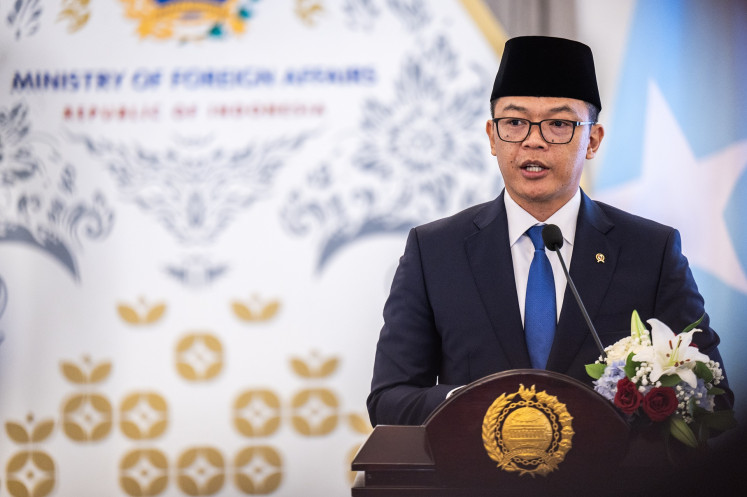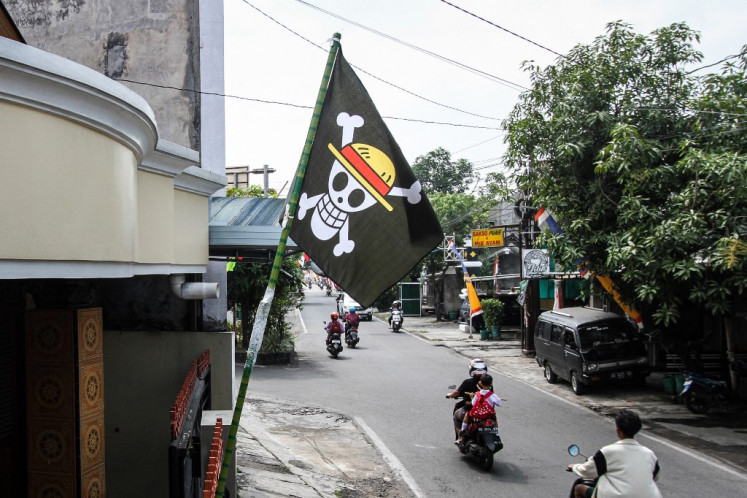Popular Reads
Top Results
Can't find what you're looking for?
View all search resultsPopular Reads
Top Results
Can't find what you're looking for?
View all search results‘Sic semper tyrannis’: History repeats itself
On the evening of Oct
Change text size
Gift Premium Articles
to Anyone
O
n the evening of Oct. 20, the dead face of Colonel Muammar Qaddafi glared through the screen of televisions and computer monitors. The dictator of Libya, severely wounded in NATO air strikes, was killed as he was attempting to escape a drainage sewer from the National Transitional Council (NTC) militias.
One international news channel broadcast amateur video footage of the dead tyrant’s body, after being shot in legs and head, was brutally stripped, kicked, abused and later paraded by both NTC militia members and civilians alike. The people he once ruled were celebrating his demise. News channels put the headlines “End of Despotism” with the picture of the dead despot’s face on their news. This indeed is how tyrants die.
Sic semper tyrannis, says the Latin phrase, which is believed to have been coined by Marcus Junius Brutus after he assassinated Julius Cesar and was shouted by John Wilkes Booth when he killed US president Abraham Lincoln.
The phrase originally means “thus always to tyrants”, but mistranslated — and widely accepted — as “this is how tyrants die”.
Either way, the statement shows how gruesome are the deaths of dictators and tyrants, as evinced in the death of Qaddafi, a dictator who ruled for 42 years.
The masses rejoiced when Qaddafi’s dead body was paraded and desecrated. For them, the years of injustice were repaid by the blood of the dictator. The people, who had been compelled to show loyalty to Qaddafi, cursed his corpse. There was no love or pity shown for their former leader, but satisfaction after prolonged contempt for more than four decades.
Seeing how graphic the mob brutality on the dead tyrant of Libya was, I could not help but think how true the Latin words were, and that what happened in Libya was possible in Indonesia. The elites in Indonesia, both the President and especially the House of Representatives, are not invulnerable to a revolt similar to the one that led to Qaddafi’s death.
The demise of Qaddafi should teach those in power a lesson to always exercise wisdom when leading and uphold justice when ruling. Only then can a leader or a government win loyalty and love from the people.
A leader or government who oppresses and victimizes the people will only reap storms. People will take revenge for the injustice and cruelty and poverty inflicted to them. Many despotic oligarchies were overthrown and many dictators fell from grace because of these mob.
Qaddafi met his gruesome end as a result of his brutal iron-fisted regime. He abused the use of military force to justify his goals and oppress his own subjects. At the end, his subjects took up arms against him.
Ultimately, he died not as hero or a leader remembered by many. He died in drainage sewer as public enemy number one. The same could happen in Indonesia. The overwhelming greed of state officials has fueled rampant corruption that has left the country and its people impoverished. The constant bickering between elites and empty resolutions as well as pointless rhetoric by the government has left many people neglected. As a result, injustice, violence and crimes tend to go unchecked.
Disregarding the needs of the people is tantamount to oppressing them, as both are manifestations of public mistreatment. The colossal unsolved cases of corruption and bribery, coupled with the government’s tendency to deliberately overlook the settlement of corruption cases and other public problems in economic, social and security realms, will sooner or later push people’s patience to the extreme.
Every afflicted subject in this land carries within themselves a silent curse, but when that reaches its boiling point, their screams will tear this land asunder. If people’s grievances are not carefully handled, impeachment and dishonorable discharges are the last things the national leaders should worry about.
The leaders resemble a boat, while their people are the ocean. Moving against the current will only get the boat to be overturned by the tides and sink, while navigating in course with the flow of the water will not only give the boat a smooth sail, but also help it reach the destination safely.
Qaddafi is one of many examples in history that a tyrant may die a tragic and grisly death. He will be unloved, unremembered and dishonored by his people. His name will be unsung and his surviving offspring and accomplices will be hunted down.
The same humiliation may await Indonesian leaders if they fail to learn from history but commit the same mistakes. Those who sow evil shall reap penance in the end.
The writer is a graduate of law at Pelita Harapan University, Tangerang.










